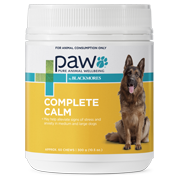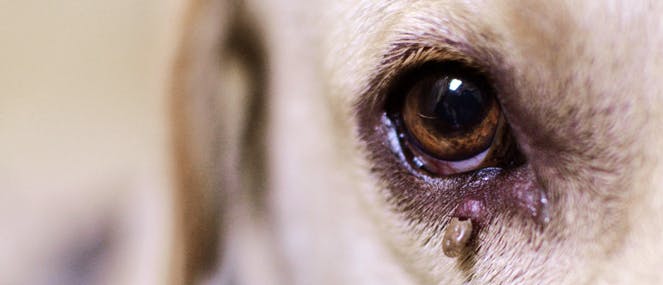
- PAW by Blackmores/
- A Guide To Perfect Your Pet's Health/
- Health and Vitality Products For Your Dog/
- Teeth Grinding From My Dog - What Should I Do?


Just like humans, dogs grind their teeth. The first step to prevention is to try and identify what they are doing at the time they are grinding their teeth. Is it when they are excited, when they lie down and are relaxed, or perhaps they are even doing it while they are sound asleep?
Depending on what breed of dog you own, the strength and size of their jaw can vary enormously. It also means that the sound of your dog grinding its teeth can range from barely noticeable to borderline frightening. Large dogs have powerful jaws, and to us it can sound quite awful.
The medical term for canine teeth grinding is bruxism and can be the sign of several health and wellbeing issues. This is something that should never go unchecked.
Common causes of teeth grinding in dogs
Ignoring bruxism also means ignoring the cause, which may be something serious - especially if left undiagnosed. From a physical perspective, dogs sometimes grind their teeth because they are experiencing pain, most commonly in their abdomen or mouth. It can also be caused by jaw abnormalities – including misalignment.The National Pet Dental Association says dogs that grind their teeth run the risk of wearing down the enamel on their teeth, which in turn may lead to more serious dental issues. This can range from fractures, exposed pulp, tooth infections, and painful teeth and gums. As such, you’ll want to have your vet examine them as soon as possible to find the cause of the grinding. The vet will offer a treatment plan to provide your pet with some relief and perhaps even put a stop to the bruxism. Ignoring it also means ignoring the underlying cause, which may be something serious especially if left undiagnosed.
Can it be stress related?
Another common cause of teeth grinding is stress and anxiety. Dogs can be very sensitive to their surroundings and if there have been any recent changes or stress around the house, such as a new baby, moving to a new house, or conflict in the home, this can cause a reaction in your pooch. Dogs with anxiety or stress related issues may benefit from anti-anxiety medication or behavioural therapy. A doggy behaviourist will be able to help you identify the route cause of the anxiety and help you to help your dog adjust to changing situations.Diagnosing bruxism
You can be your pet’s biggest advocate when it comes to a swift diagnosis, though be warned, it may take a little trial and error if the cause is not immediately obvious. In order to monitor changes, keep a note of any behavioural or lifestyle changes, changes in appetite, accidents or injuries, changes in toileting habits or a change of diet. Abdominal or stomach upsets may be at play if the grinding is accompanied by vomiting, shaking, fever or appetite loss. If this is the case, then it is important that these are mentioned to your vet so they have all the information they need to make the correct diagnosis.Dental Examination
If your pet is behaving out of the ordinary it is always advisable to seek advice from your vet. Your vet will conduct a thorough oral health assessment to examine their teeth and gums for obvious dental issues, and if they don’t spot an obvious issue, may order x-rays of their mouth. Dental problems are common in dogs and often difficult to identify at home. In addition, the vet will give them a thorough physical examination to ensure they make the right diagnosis. If the cause is not found to be dental or stress related, your vet may order other tests to see if the cause is related to their abdomen or elsewhere in their body. They may provide temporary pain relief to see if this stops the bruxism while continuing to identify the cause. If the teeth grinding is related to stress, as well as making practical changes to address the cause, your pet may benefit from having a space of their own they can retreat to.
They may also benefit from a quality stress busting supplement. Tryptophan supplementation has been shown to elevate serotonin blood levels, which may reduce the incidence of behaviour disorders including anxiety, allowing your pet a chance to relax in their home environment.
Related product:
PAW Complete Calm ChewsTasty kangaroo based chews that contain key ingredients such as Tryptophan, B group vitamins and a blend of multivitamins and nutrients to support the general health and nervous function in dogs.




